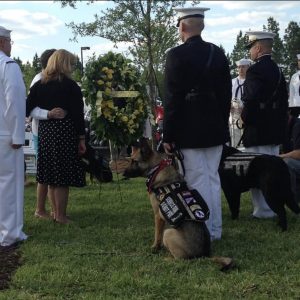We Rolled On Through the Night, Buoyed By a Brush with Death
The stars seem to shine brighter in the desert. Even in war. Perhaps especially in war. I still remember the way they flung across the vast sky as we rolled across the line of departure into Iraq in the early morning hours of March 20, 2003.
Jimmy Hendrix’s rendition of The Star Spangled Banner blared through the speakers of our amtrac.
We’d watched the towers and the bodies fall; we’d seen the Pentagon in flames. We’d seen smoke rising from a scarred Pennsylvania field.
We were Marines. We were the ones who were going to exact justice on those who’d attacked us on our very own soil, those who’d targeted not service members in uniform but everyday Americans. Innocent civilians who’d done something as ordinary as going to work or boarding a plane that fateful day.
This was our job and our duty. This is what we’d trained for.
Hendrix’s guitar rift swelled and so did our certainty—of our invincibility and righteousness.
It lasted for 10 minutes. A moment and an eternity.
Members of the Iraq republican guard had been lying in wait. And they began to shoot at us. At first, we weren’t sure what was happening. But it quickly became clear. When an Iraqi tank struck one of our tanks, we thought for a moment this might be it.
It wasn’t, of course. The opposite was true. A laugh from one of our tank guys over the radio indicated the damage had been minimal. We all opened fire.
Another moment—another eternity—passed. When it was over, the Iraqis were dead. We had taken no casualties. We rolled on through the night, a company of teenage- and twenty-something Marines buoyed by a brush with death and our ability to defy it.
Nothing gold can stay. Within 24 hours, we would suffer our first loss, shattering our sense of invincibility and bringing us face-to-face with the realities of war.
I would spend the next eight months in Iraq, the first of three combat deployments and incalculable losses that continue to this day.

Twenty-one years later, there are more than 1.9 million U.S. veterans of the wars in Iraq and Afghanistan—some 15 percent of whom carry the “invisible wounds of war” in the form of post-traumatic stress disorder, traumatic brain injury, and other traumas.
Tragically, some of these end in suicide. As many as 18 U.S. service members and veterans take their own lives every day in this county, losses that rob not just these men and women of the rest of their lives but forever impact those they leave behind. If not for my service dog, Axel, who I received after many years of suffering silently from PTSD, I might be one of them.
It’s been 21 years since I first saw combat. I try not to dwell on it. But on days like today, it’s impossible not to remember what it felt like when we believed—for a little while—that nothing could stop us.
Jason Haag is a retired Marine Corps captain and the founder and CEO of Leashes of Valor.
